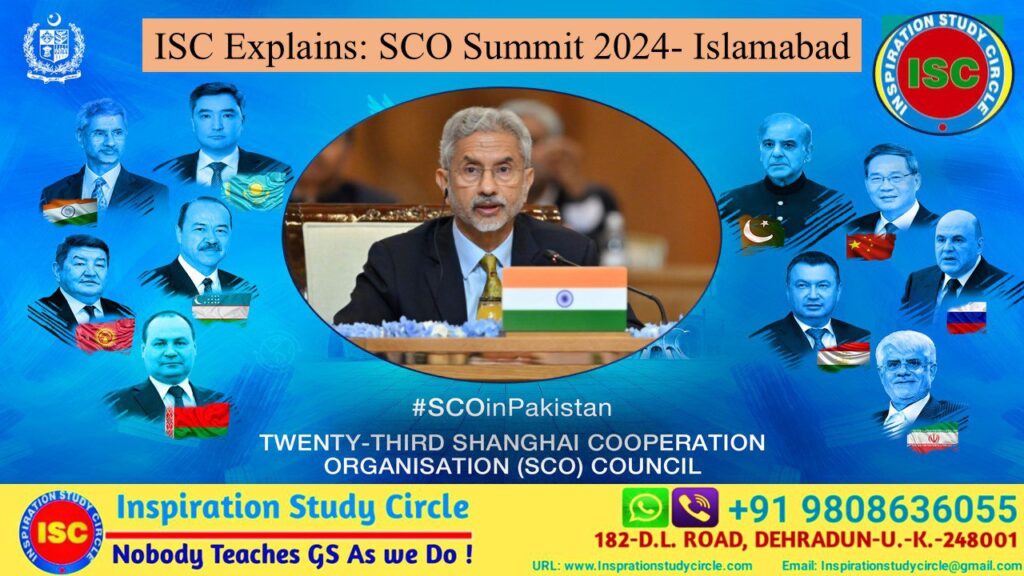
UKPSC- PCS 2026 Prelims Test Series
UKPSC- PCS 2026 Prelims Test Series Table of Contents UKPSC- PCS 2026 Prelims Test Series The Uttar Pradesh Provincial Civil

The SCO Islamabad Summit 2024 was the 23rd annual Council of Heads of Government (CHG) of the Shanghai Cooperation Organisation held between 15 and 16 October 2024 in Islamabad, Pakistan.
The summit saw participation from the following SCO member states, observer states, and guests:
Member States:
Observer state:
Mongolia – Prime Minister of Mongolia Oyun-Erdene Luvsannamsrai
Invited guests:
The Indian External Affairs Minister S. Jaishankar thanked his counterpart, Pakistani Deputy Prime Minister Ishaq Dar, and the people of Pakistan for his warm reception. He acknowledged the significance of his meetings, including face-to-face discussions with Dar during the summit.
The summit’s agenda focused on enhancing regional cooperation in various fields, including economy, trade, environment, sociology, and culture. Important discussions were expected on regional security, economic cooperation, and counterterrorism. Leaders reviewed the SCO’s performance and made key organizational decisions to enhance collaboration among member countries.
The Shanghai Cooperation Organisation (SCO) is an Eurasian political, economic, international security, and defense organization established by China and Russia in 2001. It is the world’s largest regional organization in terms of geographic scope and population, covering approximately 24% of the area of the world (65% of Eurasia)[3] and 42% of the world population.
The SCO is the successor to the Shanghai Five, formed in 1996 between the People’s Republic of China, Kazakhstan, Kyrgyzstan, Russia, and Tajikistan.[4] In June 2001, the leaders of these nations and Uzbekistan met in Shanghai to announce a new organization with deeper political and economic cooperation. In June 2017, it expanded to eight states, with India and Pakistan. Iran joined the group in July 2023, and Belarus in July 2024. Several countries are engaged as observers or dialogue partners.
The SCO is governed by the Heads of State Council (HSC), its supreme decision-making body, which meets once a year. The organization also has a Regional Anti-Terrorist Structure (RATS).
The Secretariat of the SCO, headquartered in Beijing, China, is the primary executive body of the organization. It serves to implement organizational decisions and decrees, drafts proposed documents (such as declarations and agendas), functions as a document depository for the organization, arranges specific activities within the SCO framework, and promotes and disseminates information about the SCO. The SCO Secretary-General is elected to a three-year term. Zhang Ming of China became the current Secretary-General on 1 January 2022.
The Regional Anti-Terrorist Structure (RATS) Executive Committee, headquartered in Tashkent, Uzbekistan, is a permanent organ of the SCO which serves to promote cooperation of member states against the 3 evils of terrorism, separatism and extremism.
The Director of the SCO RATS Executive Committee is elected to a three-year term. Ruslan Mirzaev of Uzbekistan became the current Director on 1 January 2022. Each member state also sends a permanent representative to RATS.
External Affairs Minister S Jaishankar traveled to Islamabad for the meeting, the first such visit in nine years.
The meeting saw some cautious movement on India-Pakistan ties, while India remained the only SCO member to not endorse China’s Belt and Road Initiative. Jaishankar also flagged India’s concerns about China and Pakistan in veiled references. Jaishankar and his Pakistani counterpart Muhammad Ishaq Dar, who is also the Deputy Prime Minister, spoke twice in less than 24 hours.
India became a full member of the Shanghai Cooperation Organization (SCO) on June 9, 2017, during the SCO Summit held in Astana, Kazakhstan. Along with India, Pakistan also became a full member of the SCO at the same time, expanding the organization’s membership to include both South Asian countries. Prior to becoming full members, India and Pakistan had held the status of Observer in the SCO since 2005.
India’s engagement with the Shanghai Cooperation Organization (SCO) dates back to 2005 when it was granted Observer status in the organization. Here is a brief history of India’s involvement with the SCO:
Overall, India’s journey within the SCO has evolved from being an Observer to a full member, reflecting its growing engagement with the organization and its commitment to enhancing regional cooperation and stability in the Eurasian region.
India’s membership in the Shanghai Cooperation Organization (SCO) provides a range of benefits across political, economic, security, and cultural dimensions. Here are some key benefits of SCO membership for India:
For India, the Shanghai Cooperation Organization (SCO) presents a valuable platform for enhancing regional cooperation, addressing common challenges, and promoting its interests in the Eurasian region. Moving forward, India can focus on several key areas to further strengthen its engagement with the SCO:
By focusing on these areas and leveraging the opportunities provided by the SCO, India can further enhance its role within the organization, strengthen regional cooperation, and contribute to peace, stability, and prosperity in the Eurasian region.
Disclaimer: The information for the above article is taken from: Indian Express and Wikipedia.

UKPSC- PCS 2026 Prelims Test Series Table of Contents UKPSC- PCS 2026 Prelims Test Series The Uttar Pradesh Provincial Civil

Explained: India AI Impact Summit 2026 Table of Contents India AI Impact Summit 2026 India AI Impact Summit 2026 The India

The Corruption Perceptions Index, and The Henley Passport Index Table of Contents The Corruption Perceptions Index, and The Henley Passport

India- USA Interim Trade Agreement (2026) Table of Contents India- USA Interim Trade Agreement (2026) In early February 2026, India and

Explained: India- EU FTA “The Mother of All Deals” Table of Contents India- EU FTA “The Mother of All Deals

UPPSC- 2026 Calendar Released Table of Contents UPPSC- 2026 Calendar Released Brought to you by Inspiration Study Circle UPPSC- 2026